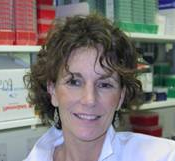Prostate cancer guidelines should change so that all men from the age of 40 with mutations in either the BRCA1 or BRCA2 gene are offered regular PSA testing to detect early signs of the disease, experts are urging.
Scientists at The Institute of Cancer Research, London, are calling for targeted screening after finding that PSA testing picked up more dangerous prostate cancers in men with BRCA1 and BRCA2 mutations than non-carriers.
Testing for the prostate-specific antigen (PSA) in the general population is not advised, because of the risk that elevated levels can pick out men with clinically insignificant prostate cancers – meaning that men may undergo unnecessary MRI scans, invasive biopsies, and treatments.
Scientists at The Institute of Cancer Research (ICR) have been working to understand who is at highest risk of the disease, and who could therefore benefit from targeted screening.
Results following five years of PSA tests
In 2019, the team reported early findings from the international IMPACT study, which showed that men with BRCA2 mutations have such a high risk of aggressive prostate cancers that they should be offered annual PSA testing. The study found that PSA testing picked up prostate cancers more often and at a younger age in these men. These findings changed European guidance.
Now, the latest results from the study – presented at the European Society for Medical Oncology (ESMO) Congress 2025 – show that men with BRCA1 mutations should also be offered an annual PSA test.
The IMPACT study – funded by Cancer Research UK, Cure BRCA, The National Institute for Health and Care Research (NIHR) Biomedical Research Centre (BRC) at The Royal Marsden NHS Foundation Trust and the ICR, and a donation directly to the ICR from The Ronald and Rita McAulay Foundation – assessed the potential benefits of PSA testing in men with BRCA1 and BRCA2 mutations at 65 centres in 20 different countries around the world.
More aggressive cancers
Men with the BRCA1 gene fault were more than three times as likely, compared with non-carriers, to have aggressive prostate cancers that are likely to grow and spread quickly.
There was no difference in age of diagnosis, or the risk of developing prostate cancer, for BRCA1 carriers compared with non-carriers.
The latest findings confirm the need for PSA testing in BRCA2 carriers – the risk of prostate cancer is more than doubled, from 1.4 per cent to 3.1 per cent, and the average age of diagnosis is 60 for carriers, compared with 65 for non-carriers.
While more accurate tests – such as a saliva test to detect genetic risk of cancer – are being trialled, targeted screening using a PSA test for those at highest risk, including BRCA1 gene fault carriers, could significantly improve early detection of the disease.
An update on screening guidance is expected
The UK National Screening Committee is currently reviewing the evidence for a prostate cancer screening programme, with an update expected soon. The ICR researchers are calling for guidance to be updated, so that both BRCA1 and BRCA2 carriers can receive annual PSA testing.
Analysis of the IMPACT study will continue, to assess the long-term impact of screening on prostate cancer outcomes.
Include BRCA carriers in any targeted screening programme
Professor Ros Eeles, Professor of Oncogenetics at The Institute of Cancer Research, London, who leads the IMPACT study, said:
“Our research shows that men with BRCA1 and BRCA2 mutations face a significantly higher risk of aggressive prostate cancer. Until more accurate diagnostic tests become available, targeted PSA screening in this high-risk group could detect these cancers earlier, when treatment is more effective.
“We are urging regulatory bodies to act on the evidence and update current guidance so that all men from 40 years with a BRCA1 or BRCA2 mutation are offered annual PSA testing. We are expecting an update to this guidance soon, and we hope to see the inclusion of BRCA carriers in any targeted screening programme, to give these men more control over their health and improve timely diagnosis.”
‘Detecting cancer early is key’
Professor Clare Isacke, Dean of Academic and Research Affairs, The Institute of Cancer Research, London, said:
“This year marks 30 years since the identification of the BRCA2 gene by a team of researchers at the ICR, including Professor Eeles. The discovery has transformed the treatment of cancer, as it paved the way for targeted therapies such as olaparib – an ICR-trialled drug used to treat breast and prostate cancers in people with BRCA mutations.
“But while treatment has advanced, detecting cancer early is key to increasing the chance of a cure. Prostate cancer is now the most common cancer in men, and with rates continuing to rise, it’s essential that we pick up clinically significant cases of prostate cancer at an earlier stage, before it has spread.
“I’m pleased to see this research establish that annual PSA testing for men with BRCA1 and BRCA2 mutations could have a significant benefit in helping to catch cancers early.”
‘Being involved in the IMPACT study saved my life’
.jpg?sfvrsn=190a2f42_1)
Image Credit: ICR/John Angerson
Tony McHale, 74, discovered he had an alteration in the BRCA2 gene when he was 61. Shortly after, he was invited to join the IMPACT study. The annual PSA test and follow-up checks revealed, 18 months later, that he had prostate cancer. Tony said:
“I couldn’t believe it. I felt completely fine and I had no symptoms. I was immediately given a three-month course of intensive radiotherapy treatment. When it ended, I was told I was clear of cancer. It was a fantastic moment. I cried with relief. It felt like I’d been given a new lease of life. Being involved in the IMPACT study saved my life. If I hadn’t taken part, I’d never have known I had prostate cancer. As far as I was aware, I didn’t have any symptoms - and the sooner the disease is detected and treated, the better the chances are of survival.”

 .
.
 .
.